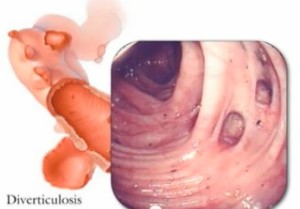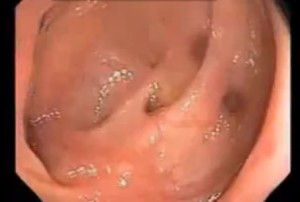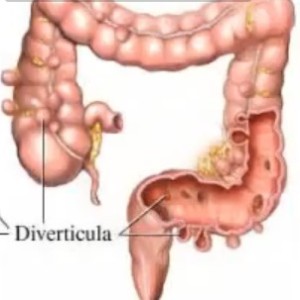What is diverticulitis ?
Diverticulitis occurs, when diverticula present in the digestive track get infected or inflamed. Diverticula are pouches-like formation in the digestive track and are mostly found in the large intestine.
The presence of diverticula is called as diverticulocis, and commonly occurs in individuals above the age of 40. One may not even know that he/she is infected as it rarely creates any problem like diverticulitis.
When diverticulitis occurs, it results in fever, severe stomach pain, nausea and disorderly behavior of bowel. Mild diverticulitis can be treated by rest, change of diet, and antibiotics, but serious cases may need surgery.
Symptoms of diverticulitis
Some of the signs and symptoms of diverticulitis are discussed below:
- Sudden and severe pain in left side lower stomach on most occasions
- In rare cases, it starts with mild stomach pain which may become severe and fluctuating after a few days
- Abdominal sensitiveness
- Disorderly stomach
- Fever
- Constipation
- Nausea and vomiting
- Diarrhea
- In rare instances, bleeding from rectum
- Bloating
There are some complication that result from diverticulitis. They are mentioned below:
- The rupture of infected pouch may result in Peritonitis, resulting in the spillage of the intestinal matter into the stomach cavity. This causes inflammation of the abdominal cavity lining or peritoneum. Peritonitis requires immediate emergency medical care.
- Scarring can cause blockage in colon.
- Rectal bleeding
- An abnormal passage way called fistula can occur between different parts of the intestine with the bladder or the vagina or the abdominal wall.
- Abscess can occur when pus accumulates in pouch.
- Even though it appears that there is no direct link between diverticular disease and rectal cancer, diverticular disease can make it difficult to diagnose cancer. In rare cases, what appears to be diverticulitis can be colon cancer. That is why doctors recommend colonoscopy and frequent cancer screening after the recovery from diverticulitis. Colonoscopy test permit the doctor to exam the entire colon and rectum, for abnormalities, using a flexible tube with a tiny video camera fixed at the tip.
Causes of diverticulitis
Diverticula normally develop in large intestine as small pouches all through the weak portions of the colon wall.
The process of infection of diverticula is not clear. One theory says that the infection of diverticula happens due to the increased pressure on the colon, leading to weakening of the wall of diverticula. Another theory says that the narrow openings of diverticula help the accumulation of fecal matter, or an obstruction in its narrow opening causes the infection and inflammation due to less supply of blood to that portion.
In past days doctors believed that nuts, popcorn, seeds and corn were responsible for diverticulitis because of they tend to get trapped in diverticula. But the later researches have shown that these are not responsible for the development of diverticulitis.
The factors shown under may increase the chances of getting diverticulitis:
- Increased age: For the unknown reason, the chances of getting diverticulitis are more for those who are above the age of 40. Age bound loss of elasticity and strength of bowl wall may contribute towards development of diverticulitis.
- Lack of exercise: For unknown reasons, lack of exercise increases the risk of developing diverticula and thereby increasing the risk to developing diverticulitis.
- Too little fiber in diet: Diverticulitis is scarce in nations where people consume high fiber diet which keep stools soft. In industrialized countries like US, the average diet is high in refined carbohydrates and low in fiber. It was found that the establishment of steel rolling mills led to reduced fiber content in flour and other grains leading to diverticular disease.
- Smoking: People who smoke a lot are prone to get diverticulitis.
- Obesity: Excessive body weight invites the risk of getting diverticulitis and diverticular bleeding
Diverticulitis treatment
Treatment of diverticulitis normally depends on the severity of the symptoms and the diagnosis. If the symptoms are mild, antibiotics and a liquid or low-fiber diet will do the trick.
Recurrent attacks of diverticulitis or risk of future complications may need advanced care.
Some of the treatment methods are listed below:
- Home care: If the condition warrants a treatment from home, then a low-fiber or liquid diet along with good rest for a few days can heal the infection. Once your health condition improves, one can go for high-fiber foods of whole grains, vegetables and fruits. In addition, the doctor may prescribe antibiotics for killing the infected bacteria. In case of severe or moderate pain, the doctor may also recommend the patient to consume over the counter medications.
- Hospitalization: In case there is a risk of developing complications, then the patient needs to be hospitalized. If there is formation of any abscess, then it needs to be drained. Other complications such as obstruction or infection of the abdominal cavity linings may require intravenous injection of antibiotics.
- Surgery: As per the severity of the condition, the doctor may also recommend surgery as an effective cure for diverticulitis. Surgery may involve either primary bowel resection or bowel resection with colostomy.
Diverticulitis pictures



generic ivermectin heartwormyell spirometer narrative